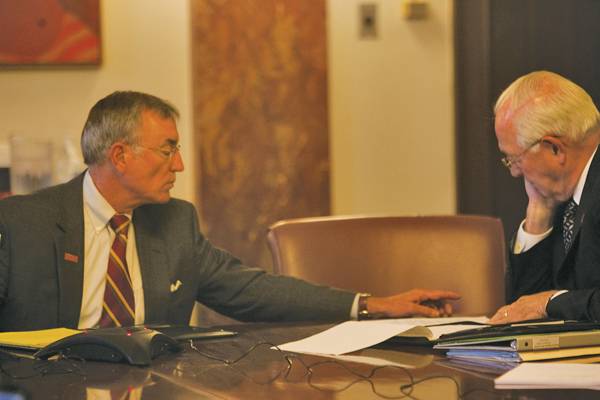UPDATED: Miles suggests universities consider tuition surcharge

ISU President Geoffroy, left, and Warren Madden, vice president for business and finance, listen in to the special telephonic Board of Regents meeting Wednesday, October 14, 2009 at Beardshear Hall. The Regents discussed options for handling university budget cuts. Photo: Karuna Ang/Iowa State Daily.
October 13, 2009
A one-time tuition surcharge for spring 2010 was suggested by Board of Regents President David Miles as a way for the Regents universities to accommodate budget shortfalls in “one of the most difficult financial environments in our history.”
An emergency telephonic meeting was held Wednesday to discuss Gov. Chet Culver’s announcement last week of a 10 percent across-the-board state budget cut. ISU administrators and campus leaders, along with members of the press, participated via a conference call in 1750 Beardshear Hall.
“Any surcharge we consider must be a very modest one,” Miles said, but he emphasized that the surcharge must be an option.
Miles said the surcharge would be an addition to tuition “one time during the spring of 2010.”
Institution heads will discuss whether a surcharge is a good idea, along with possible amounts, per Miles’ request.
Regents Craig Lang, Ruth Harkin and Greta Johnson expressed inclinations not to support a surcharge.
“I would certainly be against a combination tuition surcharge and an additional increase for 2011,” Harkin said, because of the “economic hardships on our students.” Johnson echoed these sentiments and expressed concerns that a surcharge would not make up a significant amount of lost revenue.
The surcharge was one of several initiatives Miles asked university presidents to consider as they develop the action plans they will present at the Oct. 29 meeting, at which next year’s tuition will officially be discussed for the first time.
Miles also asked the presidents to consider temporary layoffs, temporary salary reductions and temporary benefit reductions. Permanent layoffs were suggested as a last resort.
“I don’t want anyone to lose their jobs,” Miles said, a statement echoed by university administrators and Government of the Student Body President Jonathan Turk.
Miles said institution heads must strategically evaluate where the futures of their institutions lie.
“There may be elements of the institutions that were very significant in the past” that will lose their significance in the future, Miles said. He explained that permanent layoffs could come from such situations or if all other measures taken do not bridge the budget gap.
“That would definitely be at the bottom of my list, but it may be something we have to do,” Miles said.
He said the state of Iowa has reduced its investment in education over a period of several years, and that state allocations have declined to “levels not seen since 1998.” Adjusted for inflation, allocations are at levels comparable to those from 1990 and earlier.
Miles commended the heads of the institutions for a “remarkable job of doing more with less.” They must now “move swiftly and decisively” to close the budget gap, Miles said, adding that he has “tremendous confidence” in their work.
The board approved a system-wide freeze on general education-funded hirings until it receives and approves action plans from institution heads at the Oct. 29 meeting. Miles withdrew a previous proposal to institute a moratorium on new building construction projects because of the “anxiety and confusion” it generated.
Miles also discussed the cuts’ effects on the special schools, which have no alternate funding.
“As difficult as it is for the public universities, the special schools are strapped even further,” Miles said.
The Iowa School for the Deaf is expected to slash $973,000 from its budget; the Iowa Braille and Sight Saving School will eliminate $547,000.
Time concerns were raised, and in response Miles acknowledged that the Regents’ institutions have “less than a full year to get $60 million worth of a year’s expenses out.”
He said that if the nearly $60 million were to be recovered solely through a tuition increase, it would require an 8.4 percent increase. By adding the one-time American Recovery and Reinvestment Act stimulus funds of $80 million, which the budget will have to account for at the end of the fiscal year when the funds can no longer be used, Miles said a 21.5 percent increase would be necessary.
“I am not advocating and I would not support increases of that magnitude,” Miles said. “We need to be flexible and we need to consider something in excess of the median of HEPI [Higher Education Price Index] might be necessary.”
The median HEPI-suggested increase is 2.7 percent.
Miles said the Regents are doing everything they can to “protect access for … students and to protect quality.”
Turk stressed the importance of maintaining quality at Iowa State, explaining that retention is directly affected by the quality of the university.
The board will meet next on Oct. 29 in Cedar Falls. ISU President Gregory Geoffroy said nothing has been formalized in the university’s action plan.
“University leadership has a lot of work to do in the next few weeks,” Geoffroy said.
Ultimately, Miles and Turk voiced the importance of state support.
Turk said he plans for ISU students and administration to advocate for education at the state level.
“This is the student body upset with the state government and its fiscal priorities,” Turk said.
“All Iowa citizens need to recognize that if we don’t invest in these institutions, there is a price,” Miles said. “We do continue to need the support of the state of Iowa … for what are, in every respect, Iowa institutions.”






